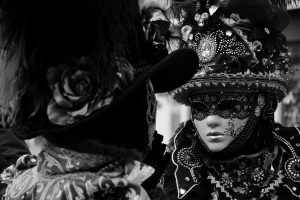Chances are, if you’re reading this article, you know that Vampire: the Masquerade is a somewhat popular tabletop RPG. (And if you didn’t know that, you can always check out the post I wrote on where to start in Vampire: the Masquerade to learn more.)
What you might not know is how the game got its name. Sure, the vampire part is pretty self-explanatory, but what exactly does the “Masquerade” mean? There’s actually a surprising amount of lore behind this subject, so I thought this would be a fun topic to cover.
Welcome to the Masquerade: An Introduction

The Masquerade is, predictably, at the heart of the game. This can vary based on the type of campaign you’re playing, but most of the time, this concept will be a central theme to your characters’ stories. Given how important it is, I felt there were a few different questions I could answer:
- What is the Masquerade, and why is it important?
- Does everyone partake in the Masquerade?
- What happens if you “break” the Masquerade?
What is the Masquerade and why is it important?
If you know what an actual masquerade is – a formal dance in which the guests wear beautiful masks – then you kind of already know what the Masquerade is in the World of Darkness. The Masquerade is the simple concept that vampires must “disguise” themselves to hide their existence from the puny humans they live among.
There’s a brief set of rules called the Traditions that, like a set of dance moves, dictate how vampires can move and behave with both each other and their human prey. Here’s a basic summary of the Traditions:
- Conceal the existence of vampires.
- Each vampire has the right to their own home/territory called a domain.
- While you are in another vampire’s domain, you must show them respect.
- A vampire can only create more vampires with the permission of an elder (usually the Prince of the city).
- Like parents, vampires are responsible for the actions of new vampires they create until said new vampires are fully educated in the ways of vampiric society.
- Elders (again, usually Princes) have the right to destroy other vampires through a massive, decreed manhunt called a blood hunt.
In some ways, the Masquerade has likely existed almost as long as vampires themselves have. However, it really came to the fore in the 15th century during the Inquisition, when vampires were hunted en masse by the church. This is around the time the Camarilla formed, which is the largest sect of vampires in the World of Darkness, as well as the greatest enforcer of the Masquerade.
I think it’s easy to see why it’s important. The Masquerade helps keep vampires from once again being persecuted by large swathes of humanity. It effectively allows them to play the role of the wolf in sheep’s clothing, blending in mostly undetected by humans.
Does everyone partake in the Masquerade?
Despite its importance, the Masquerade isn’t something vampirekind unanimously adheres to. There are many vampires who disagree with such “stuffy” old traditions, like the shadowy Sabbat sect or some Anarchs (vampires who resent that much power/influence in vampire society is held by a few elders).
Generally speaking, though, vampires tend to stick to the Masquerade because it helps them blend in.
What happens if you “break” the Masquerade?

So, I’ve already established that not everyone follows the standards of the Masquerade. In fact, there are even vampires who reveal their existence to humans by pretending to be “gods” and forming blood cults to feed on! What happens to those who choose to break stride and make their presence known to mortals?
The answer is it depends. The vampire in question will be punished, of course, but it’s generally up to the Prince of the city exactly what punishment will be administered. This can vary depending on how egregious the vampire’s violation of the Masquerade was.
For the worst offenders, the Prince is likely to declare a blood hunt. This basically means a city-wide “hit” is put on that vampire, and all other vampires in the city are encouraged to track down and kill them.
What type of Game is Vampire: the Masquerade?
If you haven’t guessed already, Vampire: the Masquerade is, well, kind of a dark game. (Given that it takes place in a setting that’s literally called the World of Darkness, this makes perfect sense.) From all the tabletop RPG options out there, it’s definitely one of the grittier choices you could make.
The best way to think of it is to imagine one of those weirdly sensual 90’s vampire movies. VtM is very gothic and punk in nature, and depending on which edition of the core rulebook you read, you’ll be strongly encouraged to incorporate gothic and punk themes into your campaign as a result.
Is Vampire: the Masquerade like DnD?
VtM is similar to Dungeons and Dragons in that they are both tabletop RPGs. I’d say the similarities pretty much end there.
Both games take place in different universes, permit you to create vastly different characters, and use different systems. If you want a more detailed comparison, you can check out the Vampire: the Masquerade vs Dungeons and Dragons post I wrote.
Wrap Up
The thing I love most about Vampire: the Masquerade is all the deep, dark lore underlying it. There are tons of cool things hiding in the background if you’re willing to do a little digging. Of course, the game only needs to be as deep as you want it to be; if all you want is a quick, fun romp in the unlife of a vampire, it can be that, too.
As I come across more questions about the setting, I’ll be sure to write more posts about them. If this is a game you’re interested in, keep checking back for more stuff.
